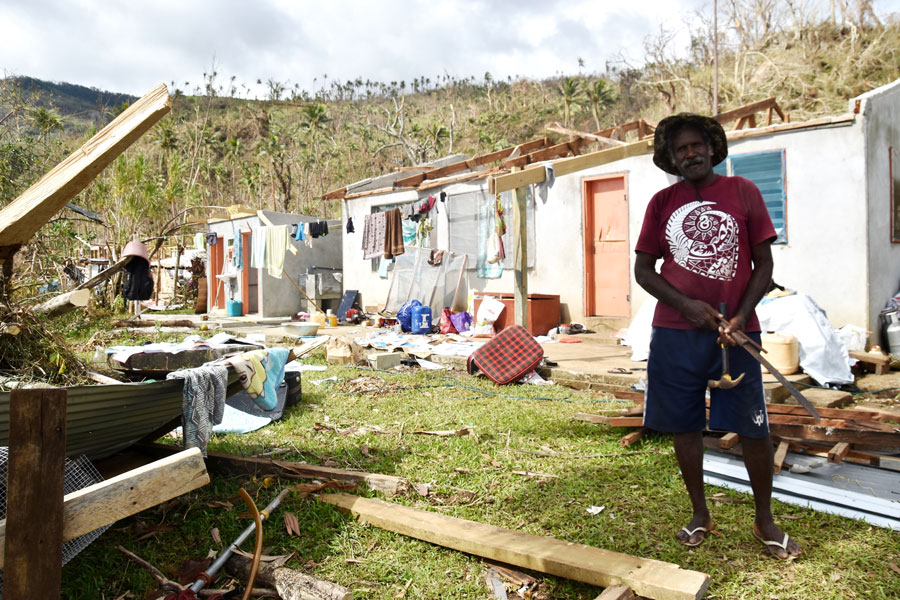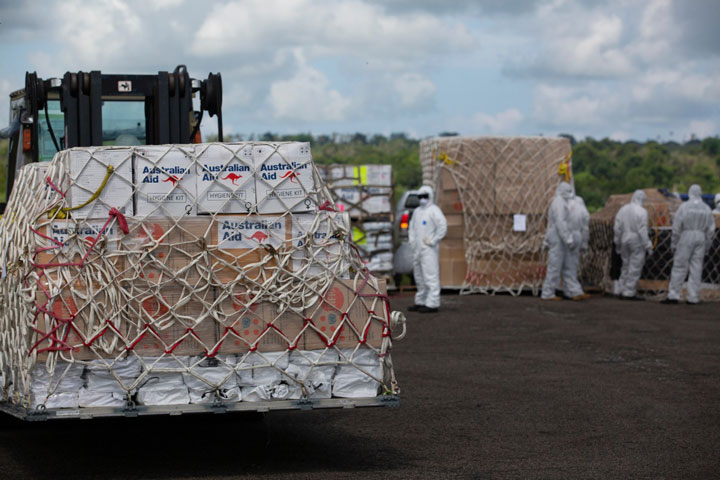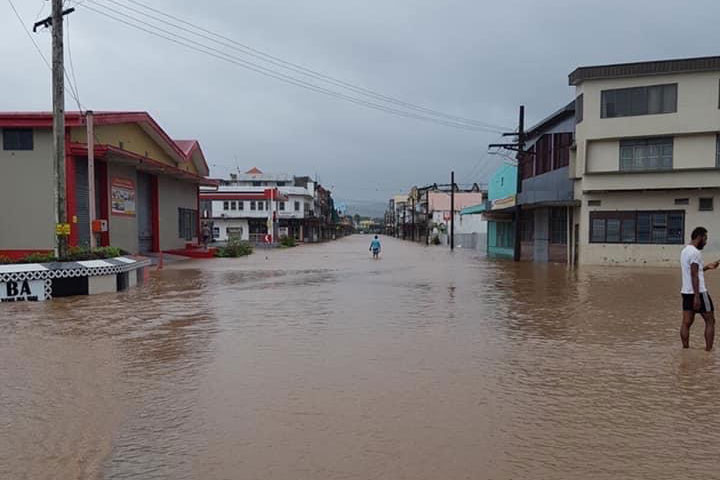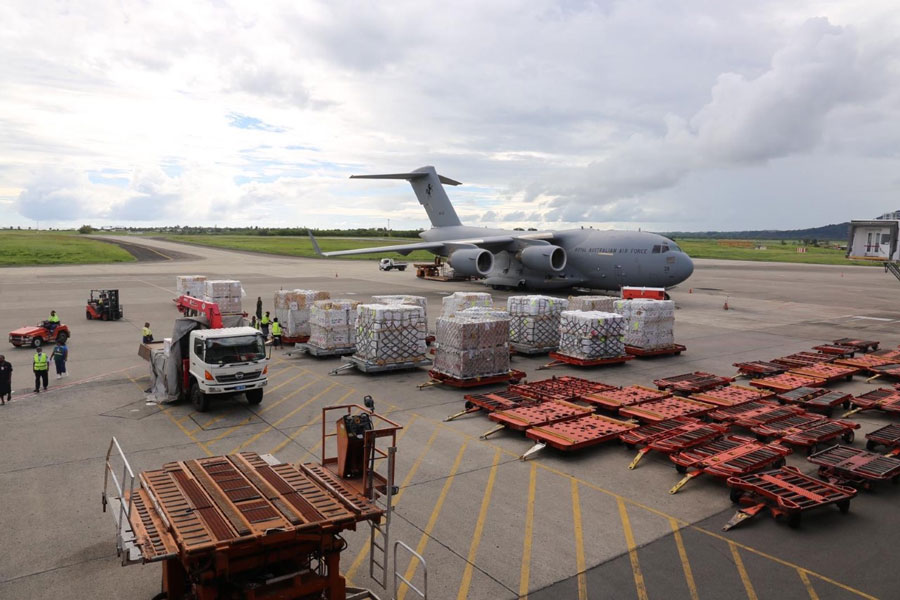Australia supported our neighbours in the Pacific to respond to Tropical Cyclone Harold.
The Tropical Cyclone first hit Solomon Islands with a Category 1 rating on 2-3 April 2020, before progressing to Vanuatu on 5 April, where it escalated to a Category 5. The cyclone went on to impact the south of Fiji as a Category 4 on 8 April, before reaching Tonga early on 9 April, having re-intensified to Category 5.
Tragically, people in Solomon Islands, Vanuatu and Fiji lost their lives to Tropical Cyclone Harold, while many more were injured.
In Vanuatu, more than 159,000 people were affected by the cyclone. The northern islands were worst hit, including the main town of Luganville, Espiritu Santo. There was significant damage to schools, agricultural crops, buildings, power, telecommunications and the local boat fleet.
In Fiji, more than 180,000 people had their homes and livelihoods affected, while 917 homes were completely destroyed nationwide, and a further 2,629 severely damaged. The agriculture sector was severely impacted, with widespread damage to infrastructure, schools and health centres, particularly to the Kadavu and Lau islands.
In Tonga, the western coast of Tongatapu and 'Eua coastal communities were particularly impacted.
Australia's humanitarian assistance
Vanuatu
In Vanuatu, more than 159,000 people were affected, including the northern provinces of Sanma (population: 53,344), Penama (32,055) and Malampa (40,917). The Vanuatu Health Emergency Operations Centre confirmed three deaths in Vanuatu.
The Shelter Cluster estimated more than 17,000 houses were severely damaged or destroyed, leaving around 87,000 people without homes. Overcrowded evacuation centres across affected areas led to high levels of stress, exacerbating already high pre-existing levels of gender based violence and child protection issues.
Significant crop damage impacted food security. Impacts on health were severe, with damage to 37 health facilities, and reported increases in communicable diseases, including conjunctivitis and diarrhoea. Education cluster assessments reported that approximately 885 schools in Northern Vanuatu were damaged or destroyed, leaving approximately 40,000 children out of school.
Australia immediately supported Vanuatu’s NDMO to undertake aerial surveillance to assess the scale of impact. Australia also supported the Red Cross and non-government organisations to release locally pre-positioned relief items, such as shelter, hygiene kits and water containers.
Following a request from the Government of Vanuatu, Australia provided a package of assistance including:
- humanitarian relief supplies, such as blankets, lanterns, shelter kits and hygiene kits, and support for logistics in-country;
- support for the Government of Vanuatu’s response operations, including essential public services such as health, education and community safety; and
- assistance to international and local NGOs to support the Government's efforts to provide immediate and medium-term support to affected communities in livelihoods, shelter, protection for women and children and psychosocial services.
On request of the Government of Vanuatu, four flights delivered humanitarian relief supplies to Vanuatu on 13, 21, 26 April and 16 May. Supplies included shelter (tents and tarpaulins) for 4,800 people, hygiene kits for more than 5,000 people, kitchen kits for more than 1,200 people, bed nets for more than 5,000 people and solar lanterns for more than 140 people. Supplies were provided by the Australian Government, the UK, UN, Australian NGOs and the Red Cross.
Australia also provided essential medical supplies to support Vanuatu’s response to COVID-19, including GeneXpert COVID-19 cartridges, enabling Vanuatu to test for COVID-19 in-country.
Strict protocols were implemented when delivering supplies to minimise any chance of transmission of the COVID-19 virus to Vanuatu.
As part of the recovery, Australia supported the repairs and reconstruction of schools and health facilities, as well as community safety initiatives. Longer-term support was also provided to assist with agriculture, livelihoods, shelter, hygiene promotion, and counselling services in partnership with Australian Humanitarian Partnership NGOs, the Red Cross and local NGOs.
Australia supported the Vanuatu Family Health Association, through the IPPF SPRINT program, to provide gender-based violence support, sexual and reproductive health services, and other essential medical care in Penama and Sanma Provinces, reaching 4,500 people.
Fiji
In Fiji, Prime Minister Bainimarama reported more than 180,000 Fijians had their homes and livelihoods affected. Nationwide, 917 homes were completely destroyed, with a further 2,629 severely damaged.
More than FJD 27m (AUD18.6m) in agricultural damage was reported, as well as FJD 66m (AUD45.6m) in infrastructure damage, including to roads, power lines and jetties. Damage to the Kadavu and Lau islands was reported as the most significant, where the Ministry of Health and Medical Services cited varying degrees of damage to all health centres.
The Ministry of Education found damage to 59 schools, impacting approximately 11,500 students.
Australia supported the Government of Fiji to undertake surveillance of the damage and to provide access to prepositioned humanitarian relief supplies.
In response to Fiji’s request for international assistance, Australia provided:
- humanitarian relief supplies made-up of shelter kits and tents, kitchen utensils, water containers and personal hygiene items, and;
- funding for the Fiji Red Cross and non-government organisations to provide community services such as rebuilding, safe access water and sanitation, and counselling support to address specific needs of vulnerable people, and;
- support to the UNFPA Regional Prepositioning Initiative to distribute 250 prepositioned dignity kits to directly benefit vulnerable women and girls in the southern islands.
Australia also directly supported the Government of Fiji in their initial response efforts and is prioritising the rehabilitation of core services, such as schools and health clinics.
In response to requests from Fiji, four Australian flights delivered humanitarian relief supplies on 18, 22 and 30 April and 1 May. Australian relief supplies delivered included shelter (tents and tarpaulins) for 3,500 people, hygiene kits for more than 8,000 people, kitchen kits for more than 10,000 people, bed nets for more than 7,000 people and solar lanterns for more than 1,100 people. Australia also delivered personal protection equipment to support Fiji’s response to COVID-19, including supplies provided by the UN and GeneXpert cartridges to enable Fiji to test for COVID-19 in-country.
Australia implemented strict protocols when delivering supplies to minimise any chance of transmission of the COVID-19 virus to Fiji.
As part of the longer term recovery in Fiji, Australia provided - support to assist with agriculture (including the distribution of crop seedlings), livelihoods, shelter, hygiene promotion, and counselling services in partnership with Australian Humanitarian Partnership NGOs, the Red Cross and local NGOs. Australia also supported the provision of cash transfers to affected communities through the Fiji Government’s own social welfare systems.
Tonga
In Tonga, damage was reported to resorts on the western coast of Tongatapu. A number of tourist resorts were hit severely due to a king tide occurring at the same time as a storm surge caused by the cyclone. The impact to other parts of Tongatapu was relatively minor, but 9 schools were reported as damaged.
On ‘Eua, significant damage was reported to some key infrastructure, including the main wharf and roads.
Tongan National Emergency Management Office and Tonga Red Cross delivered relief supplies to affected communities and households.
Australia supported the Government of Tonga’s initial response as damage assessments were undertaken, including through providing hygiene supplies, food security and protection activities.
Australia also supported the Tonga Family Health Association through IPPF and UNFPA to provide gender-based violence support, sexual and reproductive health services and other essential medical care in Tongatapu and ‘Eua, reaching 1,825 people.
Solomon Islands
Tropical Cyclone Harold passed through Solomon Islands on 2-3 April as a Category 3 cyclone.
Tragically, 27 people lost their lives when they were swept overboard on a ferry during the storm.
Australia provided the National Disaster Management Office (NDMO) with immediate emergency funding to support with damage assessments and an initial clean up.
Widespread damage was reported to agricultural crops, food gardens, homes, buildings and roads across Honiara, Western Province, Guadalcanal, Makire, Rennell and Bellona.
The NDMO identified immediate needs as food security, shelter, health and WASH (water and sanitation).
Australian Defence Force support
The Australian Defence Force played a key role in transporting the humanitarian relief supplies on four flights to Vanuatu and four flights to Fiji.
In total, Australian Defence Force flights delivered 224 tonnes of supplies to support response and recovery efforts for Tropical Cyclone Harold and COVID-19, including 74 tonnes for Australia’s UN, Red Cross and NGO partners, to support the efforts of local NDMOs, who are leading the response.
Flights brought 109 Australians and permanent residents, and 12 foreign nationals back to Australia on their return journeys.
Expertise
Australia activated the Australian Humanitarian Partnership (AHP) mechanism and worked with NGO partners on a package of assistance. Through AHP, NGOs reached over 21,000 affected people in Vanuatu with shelter and hygiene supplies, livelihood support and access to counselling services.
Community leaders who lead the responses in each of these countries included our Disaster READY partners. This partnership is a disaster preparedness and resilience program that is implemented by AHP partners and their local networks across the Pacific and Timor-Leste. Disaster READY draws on the deep networks and partnerships developed by Australian NGOs in the region to support Pacific communities and governments to better prepare for and respond to disasters, including Tropical Cyclone Harold. The program focuses on ensuring vulnerable groups, including women, people with disabilities and children, are included and accounted for in disaster preparedness, management and risk reduction activities.
Australia’s work in disaster preparedness through DisasterREADY meant that when the storm hit, local responders were trained and ready to respond by distributing locally stored humanitarian relief supplies before international support arrived.
A small group of Australians are deployed across National Disaster Management Offices in the Pacific, contributing their expertise through the Australia Assists program.
More information
- Smartraveller
- ReliefWeb – Tropical Cyclone Harold
- Overview of Australia's aid program to Vanuatu
- Overview of Australia's aid program to Fiji
- Overview of Australia's aid program to Tonga
- Overview of Australia's aid program to Solomon Islands
Media releases
- Joint media release: Foreign Minister and Minister for Defence “Immediate response to Tropical Cyclone Harold”
- Joint media release: Foreign Minister and Minister for Defence “Australia extends support for Tropical Cyclone Harold recovery
- Follow @AusHumanitarian on Twitter for more information about Australia's humanitarian response.









